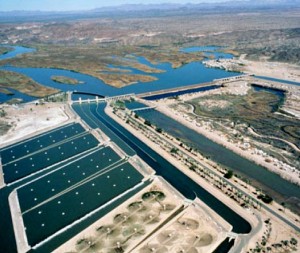California Water Wars Spotlight: Imperial Valley Water Rights

The Imperial Valley gets 20% of all the water from the Colorado River - more than Nevada and Colorado combined - and produces 80% of the country’s winter vegetables. Virtually all its water comes from the Colorado. The water is pumped in from the massive Imperial Dam on the border of California and Arizona. The dam was completed in 1938. The water rights of the Imperial Valley precede that by decades. This is a primary reason why Imperial Valley agriculture is so productive.
One of the key determinants in water rights is “got here first.” Imperial Valley farmers made claims on Colorado River water so long ago that they have in effect been grandfathered in. Their rights even predate the ancient 1922 Colorado River Compact which governs the entire watershed. Thus, they are first in line for water allocations from the Colorado River.
City dwellers tend to howl that agriculture is just a giant water pig, and worse, farmers get paid for not using water and can actually resell it. What might surprise them is that Imperial Valley farmers often oppose the water selling program. They feel it was forced upon them by the federal government and big cities. Water selling means fewer crops, which is bad for their commerce in general. Also, the decrease in leaked irrigation canal water into the giant inland Salton Sea further threatens its already imperiled future.
The water selling agreement was signed in 2003. The Imperial Irrigation District soon sued the San Diego County Water Authority (SDCWA), asking that the deal be cancelled. The matter is still in the courts. This certainly doesn’t sound like a bunch of farmers sitting around getting rich selling water to cities. Meanwhile the SDCWA just announced it may build its own pipeline to get Imperial Valley water since it currently relies on the Metropolitan Water District for that, who they are currently suing.
Retired farmer and member of the Imperial Irrigation District John Pierre Menville says “we want to be good stewards to the land, and good neighbors with our urban partners, but they want to put restrictions on us and how we grow our crops and the amount of water we use here. Why isn't someone putting restrictions on growth on the coastal plain, and their development?" Well, some coast areas do have growth restrictions. But his point is valid. Millions of homes in southern California have lush green lawns and water-sucking non-native vegetation. If Big Ag is subject to restrictions, then city dwellers should be too.
Yes, the Imperial Valley gets a perhaps unfair allotment of water from the Colorado River. But it also produces a prodigious amount of food. In total, agriculture accounts for one-sixth of California’s economy. If the water gets cut back, the economy will suffer.
Lake Mead holds water for the Imperial Valley, San Diego, and much of the southwest. It is in severe drought. This affects cities and agriculture equally, making the water wars even more intense, especially in the Imperial Valley.



